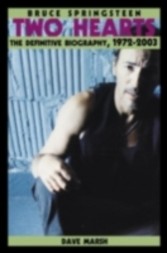
Bruce Springsteen

von: Dave Marsh
Routledge, 2003
ISBN: 9780203494707
Sprache: Englisch
582 Seiten, Download: 8110 KB
Format: PDF, auch als Online-Lesen
"2 IT’S MY LIFE (p 15-16)
Bruce Springsteen has made Asbury Park, New Jersey, famous. But that’s not really his hometown. He grew up fifteen miles inland, in Freehold, a small town of the sort that has almost disappeared since the freeways re-routed traffic. It isn’t a place of suburban ranch homes and halfacre lots. It’s the kind of community familiar to Americans who grew up before World War II—more than a bedroom to its residents, but without the pretensions of a city. There are a couple of factories—the largest makes Nescafe instant coffee—and the seat of Monmouth County, small shops rather than shopping malls. Towns like this have been sliding downhill for years, in today’s world, the very concept of such places is outmoded. Still, Freehold has a feeling of stability that tract housing can never create.
Bruce was born in Freehold on September 23, 1949, the first child of Adele and Douglas Springsteen. (They would later have two daughters, Ginny and Pam.) Their surname is Dutch (not Jewish, as is commonly supposed), but Douglas Springsteen’s ancestry is mostly Irish: his wife is Italian—her maiden name was Zirilli. Bruce apparently acquired his talent for tale-spinning from his maternal grandfather.
A story Bruce used to tell about his youthful life in Freehold sums up the place, and the time. It is, of course, considerably mythologized, but those who were around in the old days say that almost every word is true.
""I lived eighteen years of my life in a small town in New Jersey, next door to a gas station—Ducky Slattery’s Sinclair Station. That was the guy’s name, Ducky Slattery. He was an older guy. And I lived next door. ""You know how in a small town, the place where the people hang out these days is down at the gas station. Everybody comes in and sits around at the gas station. Some guy comes in, somebody goes out, pumps the gas, comes back in. Ducky Slattery and this guy Bill who was kinda… This cat had a pink Cadillac. It was a sight! Got drunk, smashed it up.
""Ducky Slattery had this one line he ripped off the Marx Brothers. Anybody’d come in, he’d say, ‘Wanna buy a duck?’ That was his big line—not too original, but it worked. ‘Wanna buy a duck?’ Whaddya gonna do with a duck?
""I had a duck…my father killed a duck for Thanksgiving once. Helped me get out of the draft. Went down to the Army, told ’em ever since I seen my father kill that duck, I go crazy every time I see a duck. Told ’em, if I was out there on the battlefield in Vietnam, and I seen a duck, I might do anything—start killin’ generals or something. I could do anything—I don’t know what I do when I see a duck."" (Bruce would actually beat the draft in the classic Sixties fashion. ""They gave me the forms and I checked everything. Even said I was a homo and all that. Then this guy calls me into his office, talks to me for about three minutes and tells me to go home."")
Douglas Springsteen had a variety of jobs, ranging from factory worker to prison concerned. Although Bruce now speaks of his father with both affectionate humor and kind of intense identification, there was a time when the mixture of love and hate all adolescents feel for their parents was seriously unbalanced. Introducing an old Animals song, Bruce used to tell this story: ""I grew up in this dumpy, two-story, two-family house, next door to this gas station. And my mom, she was a secretary and she worked downtown. She married my pop as soon as he got out of the Army, they got married and she took that job. And my father, he worked a lotta different places, worked in a rug mill for a while, drove a cab for a while, and he was a guard down at the jail for a while. I can remember when he worked down there, he used to always come home real pissed off, drunk, sit in the kitchen.
""At night, about nine o’clock, he used to shut off all the lights, every light in the house. And he used to get real pissed off if me or my sister turned any of ’em on. And he’d sit in the kitchen with a six pack and a cigarette. My mom, she’d set her hair and she would come downstairs and just turn on the TV and sit in the chair and watch TV till she fell asleep. And she’d get up the next morning and go to work again.
""My pop, sometimes he went to bed, sometimes he didn’t. Sometimes he got up. Sometimes he didn’t get up. And I used to sleep upstairs. In the summertime, when the weather got hot, I used to drag my mattress out the window and sleep on the roof next door to the gas station. And I watched these different guys—the station closed at one and these guys, they’d be pullin’ in and pullin’ out all night long. They’d be meetin’ people there. They’d be rippin’ off down the highway.
""As soon as I got sixteen, me and my buddy, we got this car and we started takin’ off. We used to take off down to the beach, sleep on top of the beach houses. We used to spin up to the city, just walk around the streets all night long ‘til the cops would catch us in the Port Authority and call our pops. My pop, he’d never come and get me. I remember he always sent my mother. Everytime I got in trouble, my mother would always come and she’d always say, ‘Your father, he don’t even wanna come.’
""I used to always have to go back home. And I’d stand there in that driveway, afraid to go in the house, and I could see the screen door, I could see the light of my pop’s cigarette. And I remember I just couldn’t wait until I was old enough to take him out once."







